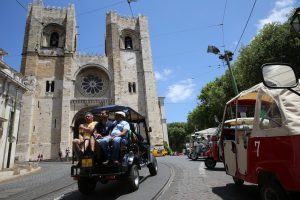Happiness has many faces, traveling is probably one of them — José Saramago
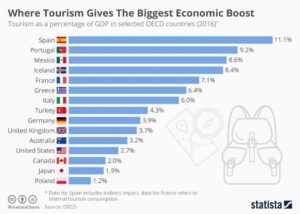
Tourism is injecting 30 million euros per day into the local economy, whereas the number of hotels in Lisbon has doubled over the last 10 years.
Tourism has not only become one of the most important pillars of the Portuguese gross domestic product (GDP), it also diminished regional asymmetries and unemployment, while increasing the national self-esteem.
Discussing its massive expansion in public, however, has become a new taboo. “The ones who are concerned about the gentrification of the historic city centres, want to destroy the economy. Those who ask for more regulation by government are unrealistic and whoever talks about the negative impact mass tourism has on other European cities, is said to be a manipulator.”
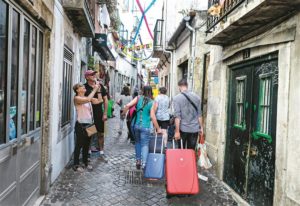
Fact remains that Lisbon and Porto have twice the number of tourists per resident than Barcelona or London and that there exists a lot of discontent about holiday rental services – such as Airbnb – and exorbitant rising rents for local tenants.
Although international tourism is more and more becoming an all year long issue, most tourists prefer to spend their summer holidays in August. They mainly come from the UK and Germany or –by car – from Spain and France, residing in apartments and small villages, either on the mainland or on the islands of Madeira and the Azores.
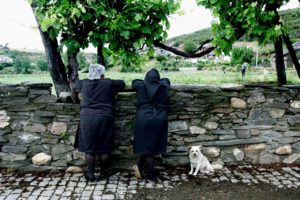 The vast majority of the Portuguese celebrate the long school holidays in their own country. Also in August, just like the tourists from abroad. Traveling by car to the northern and central countryside, and staying with the family in a hotel is their favourite way of spending leisure time. Residents of Lisbon love to visit local beaches around the capital or savour free time in their summer cottages in the sunny Algarve.
The vast majority of the Portuguese celebrate the long school holidays in their own country. Also in August, just like the tourists from abroad. Traveling by car to the northern and central countryside, and staying with the family in a hotel is their favourite way of spending leisure time. Residents of Lisbon love to visit local beaches around the capital or savour free time in their summer cottages in the sunny Algarve.
Only 10% of the Portuguese travel abroad, mostly to nearby European destinations, although Cabo Verde, Morocco, and Turkey are gaining ground. When traveling – both inside and outside the country – the Portuguese spend about 40% less money, compared to their fellow Europeans
BOM FIM DE SEMANA HAVE A GREAT WEEKEND (pics Sapo/Publico)

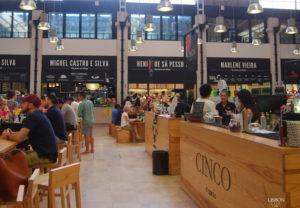 Het economisch herstel is zintuiglijk merkbaar in de stad. Overal zie en hoor je bouwactiviteiten, je voelt een nieuwe wind, ruikt de luchtverontreiniging op de Avenida da Liberdade en proeft in de talloze eettentjes – zoals op de Mercado da Ribeira, waar gerenommeerde chef-koks een betaalbare versie van hun ‘haute cuisine’ serveren – weer een boeket aan smaken.
Het economisch herstel is zintuiglijk merkbaar in de stad. Overal zie en hoor je bouwactiviteiten, je voelt een nieuwe wind, ruikt de luchtverontreiniging op de Avenida da Liberdade en proeft in de talloze eettentjes – zoals op de Mercado da Ribeira, waar gerenommeerde chef-koks een betaalbare versie van hun ‘haute cuisine’ serveren – weer een boeket aan smaken.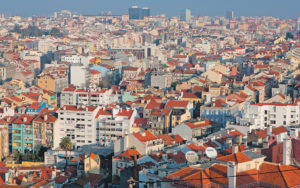 Maar er is ook een keerzijde. Grond- en huizenprijzen –zowel voor huur als koop – rijzen de pan uit, waardoor de binnenstad één groot appartementencomplex dreigt te worden, alleen nog betaalbaar voor de rijken. Dat zijn buitenlanders, die – door het Golden Visa programma – het recht krijgen om zich in Portugal te vestigen, als ze meer dan 500.000 euro voor een woning neertellen.
Maar er is ook een keerzijde. Grond- en huizenprijzen –zowel voor huur als koop – rijzen de pan uit, waardoor de binnenstad één groot appartementencomplex dreigt te worden, alleen nog betaalbaar voor de rijken. Dat zijn buitenlanders, die – door het Golden Visa programma – het recht krijgen om zich in Portugal te vestigen, als ze meer dan 500.000 euro voor een woning neertellen.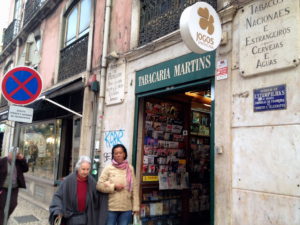 Karakteristieke buurtwinkeltjes en authentieke restaurantjes worden meer en meer opgeslokt door prijzige boetieks, dure hotels, fastfood restaurants, en internationale kledingketens, die meer voldoen aan de behoeftes van de blote-benen-toeristen dan aan die van de lokale bewoners. (
Karakteristieke buurtwinkeltjes en authentieke restaurantjes worden meer en meer opgeslokt door prijzige boetieks, dure hotels, fastfood restaurants, en internationale kledingketens, die meer voldoen aan de behoeftes van de blote-benen-toeristen dan aan die van de lokale bewoners. (